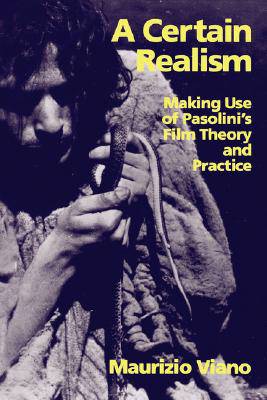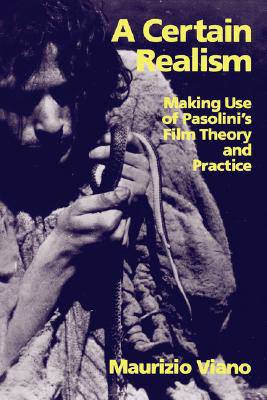
- Afhalen na 1 uur in een winkel met voorraad
- Gratis thuislevering in België vanaf € 30
- Ruim aanbod met 7 miljoen producten
- Afhalen na 1 uur in een winkel met voorraad
- Gratis thuislevering in België vanaf € 30
- Ruim aanbod met 7 miljoen producten
Zoeken
A Certain Realism
Making Use of Pasolini's Film Theory and Practice
Maurizio Viano
Paperback | Engels
€ 62,95
+ 125 punten
Omschrijving
Pier Paolo Pasolini (1922-1975) was arguably the most complex director of postwar Italian cinema. His films--Accattone, The Canterbury Tales, Medea, Saló--continue to challenge and entertain new generations of moviegoers. A leftist, a homosexual, and a distinguished writer of fiction, poetry, and criticism, Pasolini once claimed that "a certain realism" informed his filmmaking.
Masterfully combining analyses of Pasolini's literary and theoretical writings and of all his films, Maurizio Viano offers the first thorough study of Pasolini's cinematic realism, in theory and in practice. He finds that Pasolini's cinematic career exemplifies an "expressionistic realism" that acknowledges its subjective foundation instead of striving for an impossible objectivity.
Focusing on the personal and expressionistic dimensions of Pasolini's cinema, Viano also argues that homosexuality is present in the films in ways that critics have thus far failed to acknowledge. Sure to generate controversy among film scholars, Italianists, and fans of the director's work, this accessible film-by-film treatment is an ideal companion for anyone watching Pasolini's films on video.
Masterfully combining analyses of Pasolini's literary and theoretical writings and of all his films, Maurizio Viano offers the first thorough study of Pasolini's cinematic realism, in theory and in practice. He finds that Pasolini's cinematic career exemplifies an "expressionistic realism" that acknowledges its subjective foundation instead of striving for an impossible objectivity.
Focusing on the personal and expressionistic dimensions of Pasolini's cinema, Viano also argues that homosexuality is present in the films in ways that critics have thus far failed to acknowledge. Sure to generate controversy among film scholars, Italianists, and fans of the director's work, this accessible film-by-film treatment is an ideal companion for anyone watching Pasolini's films on video.
Specificaties
Betrokkenen
- Auteur(s):
- Uitgeverij:
Inhoud
- Aantal bladzijden:
- 368
- Taal:
- Engels
Eigenschappen
- Productcode (EAN):
- 9780520078550
- Verschijningsdatum:
- 15/07/1993
- Uitvoering:
- Paperback
- Formaat:
- Trade paperback (VS)
- Afmetingen:
- 152 mm x 228 mm
- Gewicht:
- 539 g

Alleen bij Standaard Boekhandel
+ 125 punten op je klantenkaart van Standaard Boekhandel
Beoordelingen
We publiceren alleen reviews die voldoen aan de voorwaarden voor reviews. Bekijk onze voorwaarden voor reviews.











